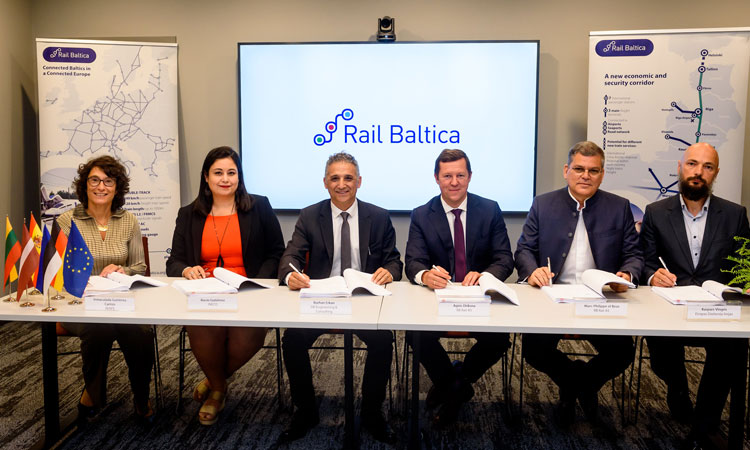Rail Baltica chooses Shadow Operator services provider
Posted: 31 August 2022 | Global Railway Review | No comments yet
The signing of the Shadow Operator agreement with globally renowned railway sector companies is an important milestone in the Rail Baltica project.


Rail Baltica Shadow Operator contract signing. Credit: RB Rail AS
An agreement has been signed with a joint venture consisting of Baltic States DB Engineering & Consulting GmbH, International Directorate RENFE-Operadora Entidad Pública Empresarial and Ingeniería y Economía del Transporte S.M.E M.P. S.A for the Shadow Operator services for Rail Baltica.
The agreement was signed between the consortium winning the public procurement tender, RB Rail AS – the Rail Baltica joint venture and central project coordinator, Rail Baltic Estonia OÜ on behalf of the Ministry of Economic Affairs and Communications and SIA ‘Eiropas Dzelzceļa līnijas’ on behalf of the Ministry of Transport of Latvia.
Shadow Operator services will be a long-haul consultancy contract for a period of six years with an opportunity to prolong the services and will remain in force until the inception of train operations on the Rail Baltica corridor. The total amount of the agreement is €8 million.
Shadow Operator services include railway engineering advisory services, providing third party independent assessment regarding the development of railway operation and maintenance for Rail Baltica, and proposing recommendations for organisational, operational, and commercial models of railway infrastructure and facilities.
Marc-Philippe el Beze, Chief Technical Officer and Member of the Management Board at RB Rail AS, said: “This is a significant and strategic step towards ensuring Rail Baltica future operations according to the highest safety and interoperability standards. While work on defining the future infrastructure model is in the progress and final decisions still to be taken, outcomes of the Shadow Operator services will bring an optimal railway operation and maintenance model along with tailored Rail Baltica operational concept, various technical strategies, plans and work procedures to meet future infrastructure management, train operation and users’ needs.”
Burhan Erkan, Executive Director, Baltic States, DB Engineering & Consulting, said: “We are convinced that Rail Baltica is one of the most important and strategically relevant infrastructure projects in Europe, aimed at fostering cohesion and connection between the Baltics and the neighbouring countries of the European Union. The nature of the Shadow Operation is to oversee the requirements of the Rail Baltica users’ from all three Baltic States and beyond, and to provide solutions from the operator’s perspective.”
Related news you will be interested in:
Rail Baltica re-announce tender for Kaunas–Vilnius section
Deadline extended for Rail Baltica high-speed railway electrification procurement
The Shadow Operator is expected to deliver best-in-class advisory recommendations on design, operation and maintenance of high-speed railway infrastructure, develop railway facilities organisational, operation and maintenance models, provide analysis of transport demand, and railway operational plan update, including implementation plan, as well as railway facilities’ commercialisation models allowing to maximise the benefits delivered by the Rail Baltica global project sustainably and effectively.
The scope of work of the Shadow Operator includes support in definition of high-speed, regional and night train passenger services, cargo train services, stations and freight terminal organisation, operation and maintenance, infrastructure operation and maintenance, and all related processes.
Anvar Salomets, CEO and Chairman of the Board of Rail Baltic Estonia, said: “Signing an agreement for shadow operation services with globally renowned railway sector companies is an important milestone to the Rail Baltica global project and our organisation, which provides a particular roadmap and competence for future operations of the railway. As Rail Baltic Estonia is in preparation for carrying out infrastructure manager tasks its crucial for ongoing transformation of the company.
Kaspars Vingris, Chairman of the Management Board at ‘Eiropas Dzelzceļa līnijas’, said: “Rail Baltica – a greenfield transport infrastructure and an economic corridor – requires a modern and optimum railway performance in operations phase. Together with our colleagues in Estonia and Lithuania we are currently in the process of developing Rail Baltica infrastructure management model to provide uniform interface for railway undertakings. We expect the Shadow Operator to support us and our colleagues to deliver recommendations that goes beyond current best practices for railway operations and maintenance. Furthermore, we are looking forward to the Shadow Operator’s expertise to contribute for setting up a service offer for our citizens and tourists at international and domestic public transport services, where the railway, notably Rail Baltica is the backbone. The first and the most important case for us is Riga Central Station which has the potential to become the largest multimodal passenger transport hub in the Baltic States, where the next level transport connectivity will be available for users enjoy already in few years’ time.”
The Shadow Operator provides its long-term operation and maintenance experience and expertise, to support the project in representing the future operation and maintenance companies during the construction phases until and beyond the start of regular operations. It defines the operation and maintenance requirements for the construction, checks that they are considered, defines operation and maintenance requirements for the definition of functionalities, helps creating tender documents and proposes the regulatory framework for the future operators and maintainers to operate the required services with the required performances. Furthermore, it will provide wide experience and advise on rolling stock provision models and types needed for dedicated passenger and freight services for future railway undertakings.
The implementation of the Rail Baltica project is financed by the national states – Estonia, Latvia, and Lithuania – and co-funded from the European Union up to 85 per cent of the total eligible costs, in the framework of the Connecting Europe Facility (CEF) funding instrument.
Related topics
Related organisations
DB Engineering & Consulting GmbH, Rail Baltica/RB Rail AS, Renfe
Related regions
Related people
Anvar Salomets, Burhan Erkan, Kaspars Vingris, Marc Philippe el Beze








